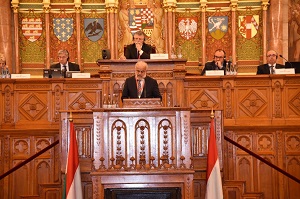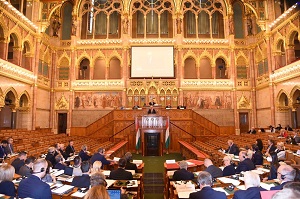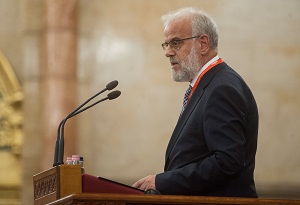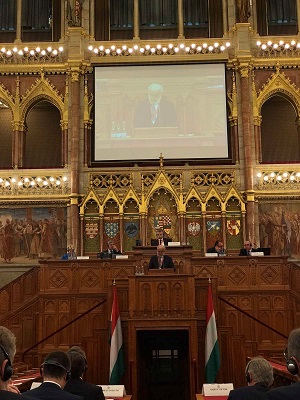
Friday, 24 September 2021, Budapest, Hungary
Address of President Xhaferi at the 10th Meeting of Speakers of Parliaments of Southeast European Countries on EU Enlargement
“Possibilities of the Southeast European Countries in contributing to the forming of the future of the EU”
Dear Speaker of the Hungarian National Assembly, Mr. Kövér,
Dear Prime Minister of Hungary, Mr. Orbán,
Dear European Commissioner for Neighbourhood and Enlargement, Mr. Várhelyi,
Dear Colleagues,
Ladies and Gentlemen,
At the very beginning, allow me to express my gratitude for the traditional holding of this event at the highest parliamentary level, organized by the Hungarian National Assembly and the Speaker László Kövér, which is another proof of Hungary's decades-long commitment to our accelerated and full European and Euro-Atlantic integration. This is our common interest given the fact that it has been repeatedly emphasized by senior European politicians - that if the Union wants greater stability in its neighborhood, then a credible European perspective for the Western Balkans based on a merit-based system is needed. However, I must underline that this perspective risks becoming tiring and unattractive for us as candidate countries if it fails and does not uphold the fundamental values on which the European Union is built, which put prosperity, peace and security of all citizens of the continent first.
 Recently, French senators visited the Republic of North Macedonia, and in conversations with them in the foregoing context, I pointed out the current state of the field – that in parallel with the high percentage of citizens who are in favor of joining the European Union and the unwavering political consensus, there is a relatively high disappointment, since each new six-month delay in the start of negotiations deprives us of opportunities to move forward in these negotiations and to work on the European agenda with even stronger motivation. France, which will subsequently hold the Council of the EU presidency, will undoubtedly support our aspirations and, certainly, we are here to help them with the Enlargement, not only for it to become one of the priorities of the French presidency, but to be a factual reality translated into the start of the first Intergovernmental Conference with the European Union. The Enlargement, as a geostrategic investment brings long-term benefits to the Union in many aspects – in political, security and economic sense. It is a good mechanism for progress and rewards, which motivates us as countries to implement the required reforms whose end result should be the beginning of negotiations, access to more funds and finally, full membership in the Union. I believe that, as states, we have shown that we can cope with the challenges of the integration process and successfully implement the required reforms within the set deadlines, thus confirming that we are serious partners in this joint project.
Recently, French senators visited the Republic of North Macedonia, and in conversations with them in the foregoing context, I pointed out the current state of the field – that in parallel with the high percentage of citizens who are in favor of joining the European Union and the unwavering political consensus, there is a relatively high disappointment, since each new six-month delay in the start of negotiations deprives us of opportunities to move forward in these negotiations and to work on the European agenda with even stronger motivation. France, which will subsequently hold the Council of the EU presidency, will undoubtedly support our aspirations and, certainly, we are here to help them with the Enlargement, not only for it to become one of the priorities of the French presidency, but to be a factual reality translated into the start of the first Intergovernmental Conference with the European Union. The Enlargement, as a geostrategic investment brings long-term benefits to the Union in many aspects – in political, security and economic sense. It is a good mechanism for progress and rewards, which motivates us as countries to implement the required reforms whose end result should be the beginning of negotiations, access to more funds and finally, full membership in the Union. I believe that, as states, we have shown that we can cope with the challenges of the integration process and successfully implement the required reforms within the set deadlines, thus confirming that we are serious partners in this joint project.
 Dear Colleagues,
Dear Colleagues,
The Republic of North Macedonia has made impressive progress in the field of implementation of the key reform package, and with the signing and implementation of the Ohrid Framework Agreement we have shown that we can serve as a model for internal cohesion and the promotion and nurturing of interethnic relations. We believed that by signing the agreement with Bulgaria and accepting all the proposals of the Presidency of the European Union presented last year, including the proposal of May 2021, we would overcome the dispute with the Republic of Bulgaria. But unfortunately, the response from Bulgaria is quite in the opposite direction, it completely changes the approach to the process, which is contrary to the efforts to build trust and smooth political dialogue. Certainly, the current complex situation in Bulgaria prevents a more active dialogue, including at the parliamentary level, where as fellow MPs we could talk more openly and in a more flexible way, and jointly contribute to overcoming this situation by finding a compromise on open issues.
 However, despite all the obstacles, we continue with the reform process – for the country, for our citizens and for maintaining the high marks we have already received. We have been active for twenty years in the context of mutual cooperation in the region of Southeast Europe and the generated good results confirm that, as countries, we can successfully cooperate regionally and experience mutual success, which is a key precondition for our European future. I am convinced that parliamentary diplomacy can establish a dialogue that contributes to peace and security and plays an essential role in tackling global challenges, and that is why we are active in international assemblies.
However, despite all the obstacles, we continue with the reform process – for the country, for our citizens and for maintaining the high marks we have already received. We have been active for twenty years in the context of mutual cooperation in the region of Southeast Europe and the generated good results confirm that, as countries, we can successfully cooperate regionally and experience mutual success, which is a key precondition for our European future. I am convinced that parliamentary diplomacy can establish a dialogue that contributes to peace and security and plays an essential role in tackling global challenges, and that is why we are active in international assemblies.
Dear Colleagues,
In the Charter on Good-Neighborly Relations, Stability, Security and Cooperation in the South East Europe of 2000, we have jointly committed ourselves to our unreserved commitment to, among other things, respecting the principles and norms of the Charter of the United Nations, and I hope that these postulates will help resolving open issues and thus contribute to accelerating the European integration process.
Thank you for your attention!